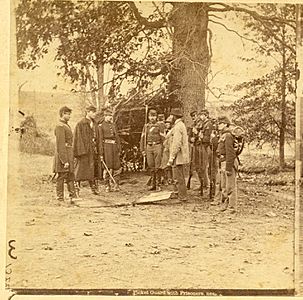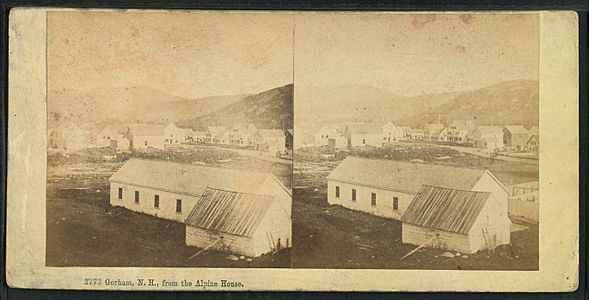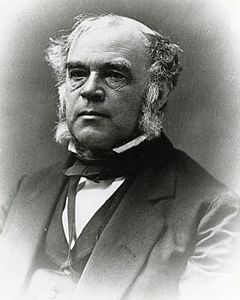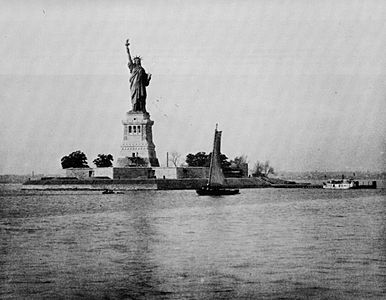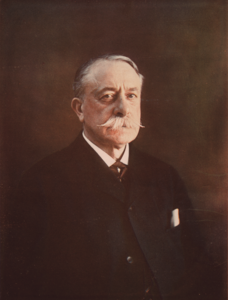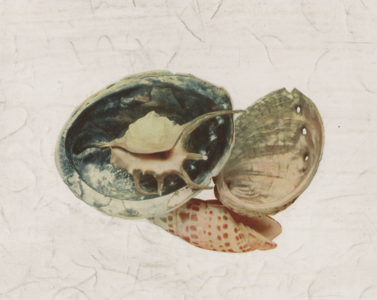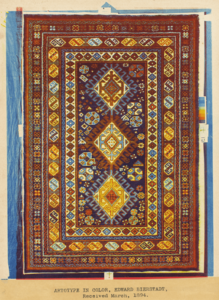Edward Bierstadt facts for kids
Quick facts for kids
Edward Bierstadt
|
|
|---|---|
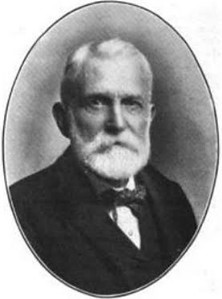 |
|
| Born | September 11, 1824 |
| Died | June 15, 1906 (aged 81) New York City, U.S.
|
| Occupation | Photographer, engraver |
Edward Bierstadt (born September 11, 1824 – died June 15, 1906) was an amazing photographer and engraver. He took pictures of people (portraits) and beautiful outdoor scenes (landscapes). Edward was also one of the first people to experiment with color photography in the United States.
Contents
Edward Bierstadt's Early Years
Edward Bierstadt was born on September 11, 1824, in a place called Solingen, which was then part of Prussia. His father, Henry, was a barrel maker. Edward had a younger brother, Albert Bierstadt, who later became a very famous painter. When Edward was a boy, his family moved to the United States. They made their new home in New Bedford, Massachusetts.
Edward's Photography Career
In 1860, Edward Bierstadt opened his own photo studio in New York City. He worked with his brother, Albert, turning Albert's paintings into engravings. Edward also created special 3D pictures called "stereoscopic images" for a company called Bierstadt Brothers. He did this with his other older brother, Charles Bierstadt.
Photographing the Adirondacks
Edward was hired by a man named William West Durant to take many photos for a special brochure. This brochure was called The Adirondacks, Artotype Views Among the Mountains and Lakes of the North Woods. Its purpose was to show off the beauty of places like Blue Mountain Lake and Raquette Lake in the Adirondacks.
Starting a Printing Company
In 1870, Edward started his own company called the Photo-Plate Printing Company. This company made a type of print called "collotype prints." These prints were used to illustrate many important books. Edward's company was known as one of the best printers in the United States.
Improving the Stereoscope
Edward Bierstadt also invented things! In 1876, he received a special patent for making the stereoscope better. A stereoscope is a device that lets you look at two pictures at once to see a 3D image. He and his brother made many stereoscopic photos from all over the country. Sometimes, these photos were simply credited to "Bierstadt Brothers."
Pioneer in Color Photography
Edward Bierstadt was a true pioneer in the world of color photography. He mostly used a method called the "subtractive method" to create his color photos. This method involves removing certain colors of light to create the final image. Edward learned about color photography from another photographer named Joseph Albert.
Exhibiting Color Prints
In November 1877, Edward showed off three of his color prints at the American Institute in New York City. His work in color photography really got noticed in 1894. He displayed color prints of oil paintings, watercolor paintings, portraits, and even flower pictures. Edward's color pictures of rugs were so accurate that salesmen used them instead of carrying heavy rugs!
First Color Portraits
Edward Bierstadt claimed he made color portraits as early as July 1890. This might be the earliest claim for a color photographic portrait ever! He first showed his color portraits in 1892 and continued to do so for many years. These portraits took several minutes to expose, but people thought they were amazing, even with small imperfections. The only color portrait by Edward that still exists today is of his younger brother, Albert Bierstadt.
Color Microscopic Photography
Edward's work with color photography also included tiny things! He worked with Dr. Edward Leaming from Columbia College. Together, in 1895 and 1896, they made color photographs of microscopic specimens. Even when Edward turned 80 in 1904, he was still busy researching and working on color photography. Edward Bierstadt passed away in New York City on June 15, 1906.
Gallery
-
Stereo photograph of Gorham, New Hampshire, made by the Bierstadt brothers
-
John William Draper, American scientist and pioneer of photography, c. 1879
-
The Statue of Liberty, c. 1886
-
Portrait of Albert Bierstadt, possibly the oldest surviving color portrait photograph. This collotype print was sent in 1895 to Elbridge T. Gerry.
 | Leon Lynch |
 | Milton P. Webster |
 | Ferdinand Smith |


